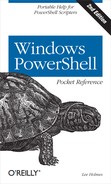Access.Application | Allows for interaction and
automation of Microsoft Access. |
Agent.Control | Allows for the control of Microsoft
Agent 3D animated characters. |
AutoItX3.Control | (nondefault) Provides access to
Windows Automation via the AutoIt
administration tool. |
CEnroll.CEnroll | Provides access to certificate
enrollment services. |
Certificate Authority.Request | Provides access to a request to a certificate authority. |
COMAdmin.COMAdminCatalog | Provides access to and management of the Windows COM+ catalog. |
Excel.Application | Allows for interaction and
automation of Microsoft Excel. |
Excel.Sheet | Allows for interaction with
Microsoft Excel worksheets. |
HNetCfg.FwMgr | Provides access to the management
functionality of the Windows Firewall. |
HNetCfg.HNetShare | Provides access to the management
functionality of Windows Connection Sharing. |
HTMLFile | Allows for interaction and
authoring of a new Internet Explorer document. |
InfoPath.Application | Allows for interaction and
automation of Microsoft InfoPath. |
InternetExplorer. Application
| Allows for interaction and
automation of Microsoft Internet Explorer. |
IXSSO.Query | Allows for interaction with
Microsoft Index Server. |
IXSSO.Util | Provides access to utilities used
along with the IXSSO.Query
object. |
LegitCheckControl.LegitCheck | Provide access to information about
Windows Genuine Advantage status on the current
computer. |
MakeCab.MakeCab | Provides functionality to create
and manage cabinet (.cab) files. |
MAPI.Session | Provides access to a Messaging
Application Programming Interface (MAPI) session, such as folders,
messages, and the address book. |
Messenger.MessengerApp | Allows for interaction and automation of
Messenger. |
Microsoft.FeedsManager | Allows for interaction with the
Microsoft RSS feed platform. |
Microsoft.ISAdm | Provides management of Microsoft
Index Server. |
Microsoft.Update. AutoUpdate | Provides management of the auto
update schedule for Microsoft Update. |
Microsoft.Update.Installer | Allows for installation of updates
from Microsoft Update. |
Microsoft.Update.Searcher | Provides search functionality for
updates from Microsoft Update. |
Microsoft.Update.Session | Provides access to local
information about Microsoft Update history. |
Microsoft.Update.SystemInfo | Provides access to information
related to Microsoft Update for the current system. |
MMC20.Application | Allows for interaction and
automation of Microsoft Management Console (MMC). |
MSScriptControl. ScriptControl
| Allows for the evaluation and
control of WSH scripts. |
Msxml2.XSLTemplate | Allows for processing of XSL
transforms. |
Outlook.Application | Allows for interaction and
automation of your email, calendar, contacts, tasks, and more
through Microsoft Outlook. |
OutlookExpress.MessageList | Allows for interaction and
automation of your email through Microsoft Outlook Express. |
PowerPoint.Application | Allows for interaction and
automation of Microsoft PowerPoint. |
Publisher.Application | Allows for interaction and
automation of Microsoft Publisher. |
RDS.DataSpace | Provides access to proxies of
Remote DataSpace business objects. |
SAPI.SpVoice | Provides access to the Microsoft
Speech API. |
Scripting.FileSystemObject | Provides access to the computer’s
filesystem. Most functionality is available more directly through
PowerShell or through PowerShell’s support for the .NET Framework. |
Scripting.Signer | Provides management of digital
signatures on WSH files. |
Scriptlet.TypeLib | Allows the dynamic creation of
scripting type library (.tlb) files. |
ScriptPW.Password | Allows for the masked input of
plain-text passwords. When possible, you should avoid this,
preferring the Read-Host cmdlet
with the -AsSecureString parameter. |
SharePoint.OpenDocuments | Allows for interaction with
Microsoft SharePoint Services. |
Shell.Application | Provides access to aspects of the
Windows Explorer Shell application, such as managing windows, files
and folders, and the current session. |
Shell.LocalMachine | Provides access to information
about the current machine related to the Windows shell. |
Shell.User | Provides access to aspects of the current user’s Windows session and profile. |
SQLDMO.SQLServer | Provides access to the management
functionality of Microsoft SQL Server. |
Vim.Application | (nondefault) Allows for interaction
and automation of the VIM editor. |
WIA.CommonDialog | Provides access to image capture through the Windows Image Acquisition
facilities. |
WMPlayer.OCX | Allows for interaction and automation of
Windows Media Player. |
Word.Application | Allows for interaction and
automation of Microsoft Word. |
Word.Document | Allows for interaction with Microsoft Word
documents. |
WScript.Network | Provides access to aspects of a
networked Windows environment, such as printers and network drives,
as well as computer and domain information. |
WScript.Shell | Provides access to aspects of the
Windows Shell, such as applications, shortcuts, environment
variables, the registry, and the operating environment. |
WSHController | Allows the execution of WSH scripts
on remote computers. |
